Why we like what we like
And other mysteries explored over sangria
During my first moments in a new city, I scan myself for a feeling I can’t name, but I know it when I feel it.
If I try to assign deficient language to it, it’s something like:
Oh, I GET this place.
Like getting a joke or getting the picture or getting what you’re saying, the feeling is one of immediate resonance—a “clicking.”
Years ago, after arriving at the Melbourne airport, I took a taxi ride along the ribbon of smooth pavement toward the bulky downtown and, in mere minutes…I got it. Instant recognition.
And though I was in Sydney longer, I never felt that way. The city somehow remained a stiff acquaintance, like a perfectly lovely coworker with whom you share a lot in common, but you can never quite crack. Conversation always deflates after a short back-and-forth and then you’re just standing and smiling at each other like weirdos, and there’s really no rhyme or reason why you don’t gel.
In contrast, Melbourne and I sustained ongoing chatter.
This is precisely the experience I had last week while visiting Madrid: a lively interruptive back-and-forth that still hasn’t ended.
I had a hunch I would love it ever since reading this description a decade ago:
Madrid is not as dramatically beautiful as, say, Paris or Barcelona, but the more you get to know it, the more beautiful it becomes. Madrid doesn’t have any blatantly tourist-only areas, the way other big cities do. All the neighborhoods have locals, and I love how all the monuments and homes and restaurants are mixed together.
That little portrayal put Madrid smack dab on my list: I freak out in touristy areas (despite living in one!), and I appreciate cities that are pretty in their own distinct way rather than the glamorous pageant queens. (The Avrils over the Britneys, for my millennials.)
It took me a while to go back to Spain after a rather traumatic episode the first time around, but I quickly fell so hard for Madrid that I forgot to bring my emotional baggage.
Being there was a weeklong sunrise: unmitigated joy.
I love asking friends and strangers alike which places resonate with them, and which don’t. People can rarely put their finger on exactly why or why not, so it’s an exciting human mystery to explore.
Why, for example, even after several visits, do I have zero attachment to Paris—maybe the world’s most beloved city? What am I not seeing what captivates so many others?
Why, for another example, does Berlin feel like a city-wide glue trap for me? Why did it instantly grab me with overwhelming intensity, and leave its sticky residue all over my heart for years to come?
“Past life?” some might surmise, and I might agree; what else accounts for the sense recognition that makes no sense?? (If you’d like to lose a few hours to the depths of the internet, here’s an extreme case of that phenomenon!)
Others have mentioned “astrocartography,” where your astrological birth chart shows spots on the world map which are the most meaningful for you. Welp, I did my chart and all my special places are in the middle of the ocean!
Maybe a simpler explanation is one of values. I strongly value joie de vivre, carpe diem, presence, and the pursuit of fun. Thus, I’m drawn to more extroverted cultures who prioritize long lingering dinners and laughter over, like…being on time.
(Though I’ve lived in such a country, and often thought, “You all could stand to be a little LESS relaxed!!!!” especially while waiting at the bank or visa office.)
Which brings me to an idea I’m constantly fidgeting with: Every trait (of a human or culture) has a desirable side and an unappealing side. Light and shadow. Strength and weakness. Someone who is always reliable is rarely the life of the party, etc.
In Madrid I chatted with an academic from South America who is now living in Oxford, and I asked him what he liked best and least about the UK. He replied, “It’s the same answer: structure.”
I got to thinking about the shared ‘best and worst’ attribute of other cultures I’m familiar with.
In the US, I’d say a defining characteristic is “forward-thinking.” That’s great for getting us to the moon, but it also means we’re overly-confident when it comes to learning (or refusing to learn) from history.
I think of Americans as the hyper middle-schoolers of the world, with an infectious enthusiasm and creativity, but with no desire or ability to sit still and listen to the wisdom of adults.
We’re the cocky 12-year-olds rebelliously skateboarding around an area clearly marked with restriction signs, but who cares if we get hurt, because in our minds, we’re invincible. Only the boring grown-ups care about falling!
Then there are the elder cultures, measured and cautious, calmly observing others from their dusty but orderly libraries. Perhaps from the trauma of recessions and war, or from the skepticism that naturally tends to creep up on older people, they are horrified by youthful recklessness but get stuck in their own ways—forgetting what it was once like to believe that anything is possible.
There are the ones so mired in a history of corruption that they trust no one, and therefore everyone, and “Who knows what will happen tomorrow?” is the same driving force behind their enviable celebratory spirit and their annoying-to-detrimental reluctancy to get stuff done.
Madrid demonstrated a surprising mixture of attributes.
The stench of war lingers around street corners and on restaurant menus and in mindsets throughout the whole country to this day. Many “Spanish delicacies” come from a period of starvation where people, eating weeds to survive and trading rations on the black market, discovered bitty edible sea creatures that hadn’t held much appeal back in the time of plenty. Waiters still bring out entire bottles of wine and liquor in order to pour a glass/shot, a leftover assurance from the economic crisis when restaurants would mix alcohol with fillers behind the bar.
At the same time, Madrid is a sophisticated design capital and shows off the most lavish architecture I’ve seen in one compact city center. Prudence and opulence mingle in the neighborhood plazas.
As do all walks of life, stylishly dressed.
Like most of the places and cultures I particularly connect with, I regularly remember that life is short, and I live accordingly.
I value happiness high over loyalty; I’m not going to stick around with something that doesn’t immediately enthrall me (e.g. book, movie, city).
But I wonder if that’s a flawed way to live. Possibly a very American way to live.
I remember a Chinese exchange student in college explaining, “In America, love looks like a boiling pot of water that you take off the stove and put on the counter to cool down. In China, love looks like a cold pot of water that you put on the stove to heat up over time.”
After college, I knew I wanted to live abroad for a spell, and I heard that both China and Chile were actively accepting young dumb-dumbs like me to come teach English. Being vegetarian, I did some cursory research and figured that Chile had more options, so I made my decision. I moved to Santiago with about five words of Spanish and a truly astounding lack of teaching skills.
And Santiago was not one of those “I GET this place” places. Far from it.
Much like Mexico City, another wildly popular destination that I can’t quite get a read on, Santiago seemed to me like a Franken-city: a jerry-rigged mishmash of disparate parts, unconvincingly trying to pass as a cohesive metropolis. I didn’t find it beautiful, aside from the majestic Andes and the magenta house where I rented a sparse room with a metal-barred window that a lemon tree was determined to poke its branches through.
For the first couple months, I panicked, suspecting that maybe I belonged somewhere else, as though I’d misread the instructions to my own life.
Like, “Ohhhhh wait…page 22 says SAN DIEGO NOT SANTIAGO.”
Or, even scarier, like I missed the day at school where everyone received their life instructions so I was the only one winging it.
But then….
The pot got warm. And warmer. And warmer. And, by the end, the water was at a rolling boil.
I had made Santiago my own. I learned its complexities, its quirks, and the charm of its “flaws.” I grew painfully fond of those proverbial birthmarks and crooked teeth and morning breath you adore of the person you love.
I discovered so many things I’d ignored while I was busy waiting for a starry-eyed romance to catch fire. So much so, that I was hungover from the ferocity of my love for Santiago many years after I left. It had become the most beautiful place in the world to me.
I wonder if that’s the reason I’m drawn to the more underdog cities now. When a place is too in-your-face spectacular, I wonder what it’s hiding (like anti-tourist waterguns!?)
Whereas when it holds a quieter allure, I take it upon myself to scavenger-hunt its jewels in the side streets and cluttered shops. Maybe that skill I learned in Santiago is why I knew I could so easily love Madrid. Maybe I’ve learned how to accelerate that boil.
Or, maybe that “GETTING” is just a mystery, plain and simple. Like friendship, romantic love, inclinations, skill sets, beliefs, favorite colors, hated musical genres.
Do they come from DNA lost to time, the first movie you ever watched, a good teacher, a past life, an astrology chart that you forgot to rotate sideways and all the points on the map show all the places you’ve ever loved?
Who knows?
But it’s fun to think about. :)
And…may I suggest Madrid??


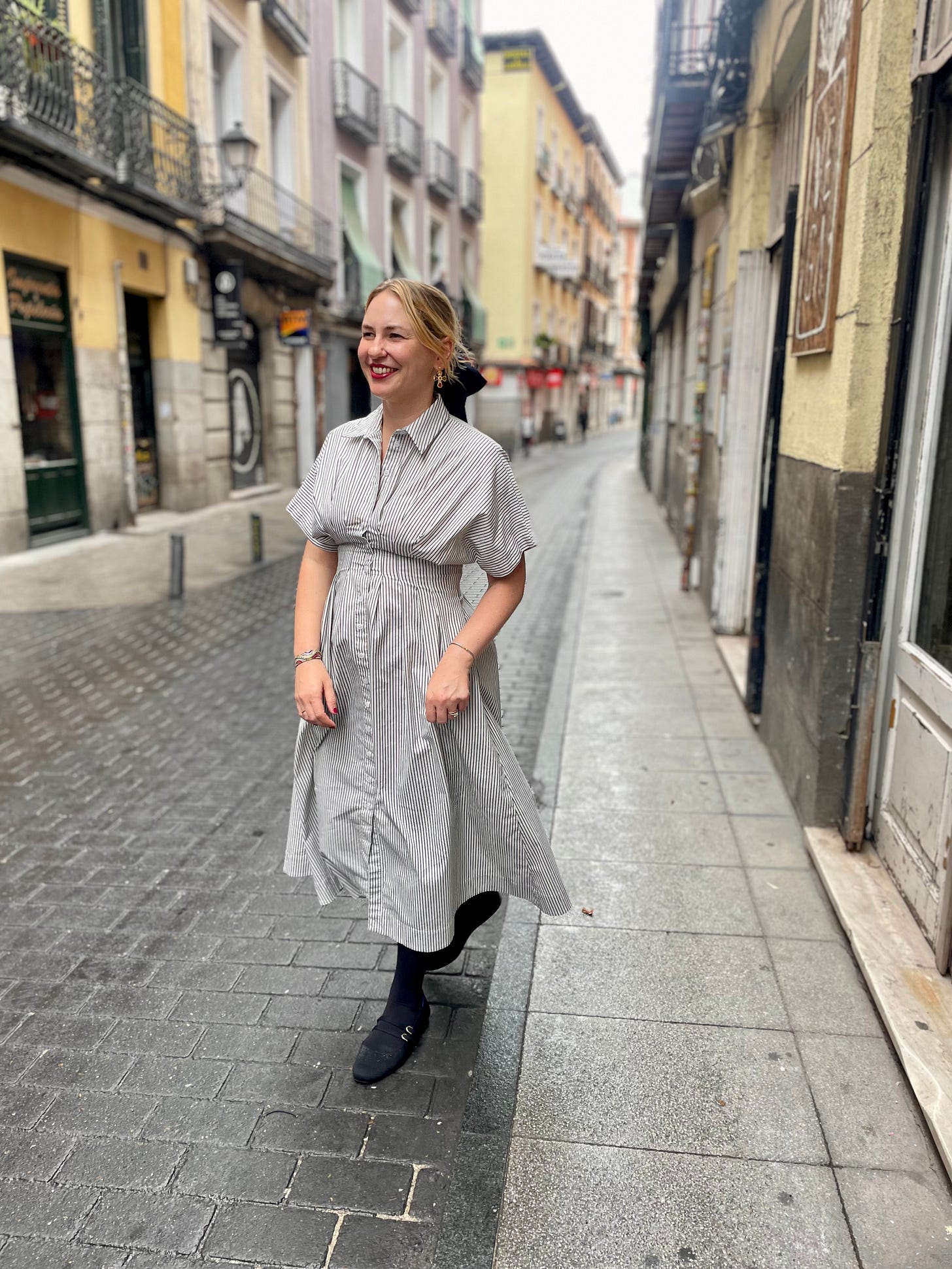
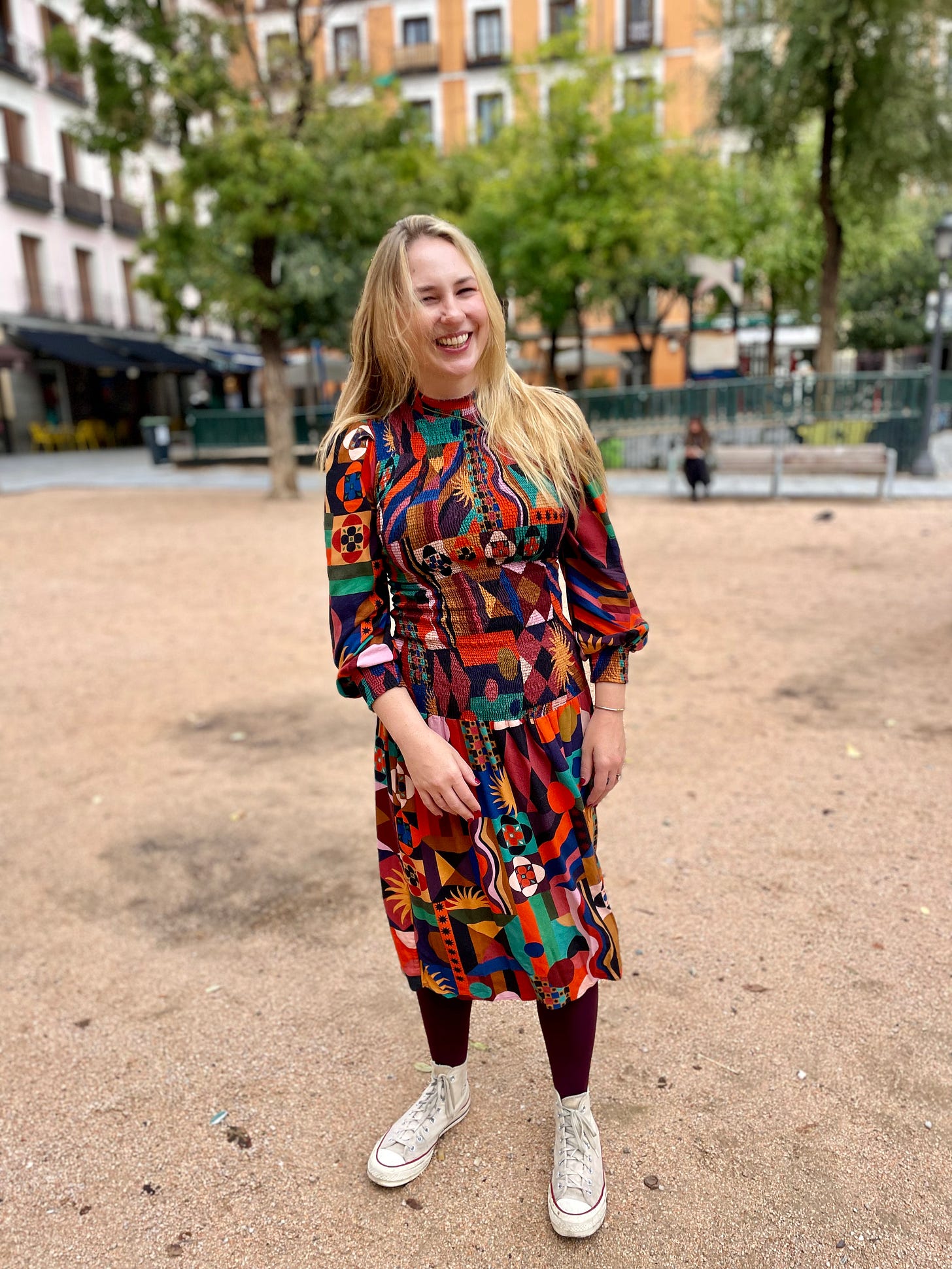
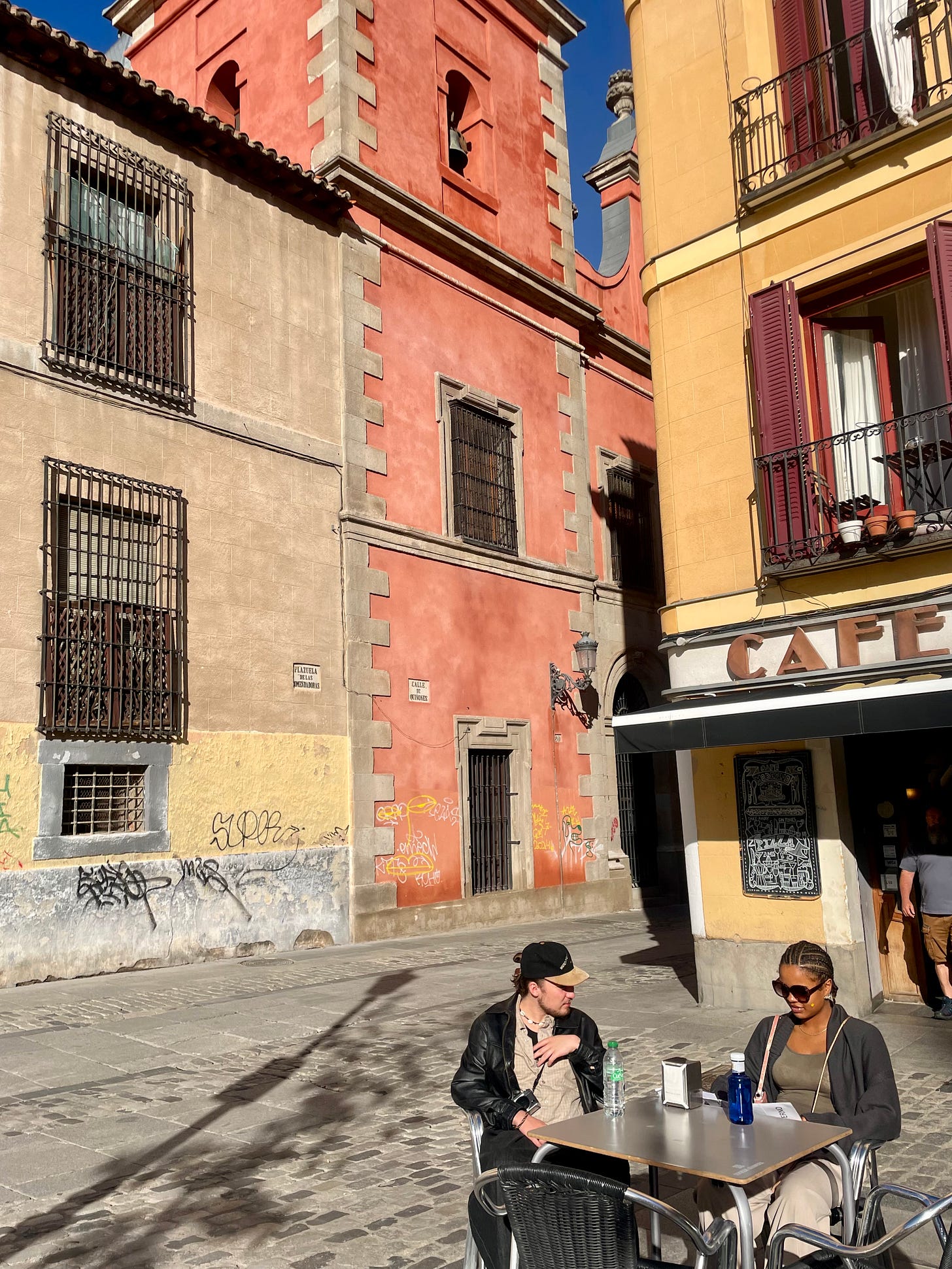
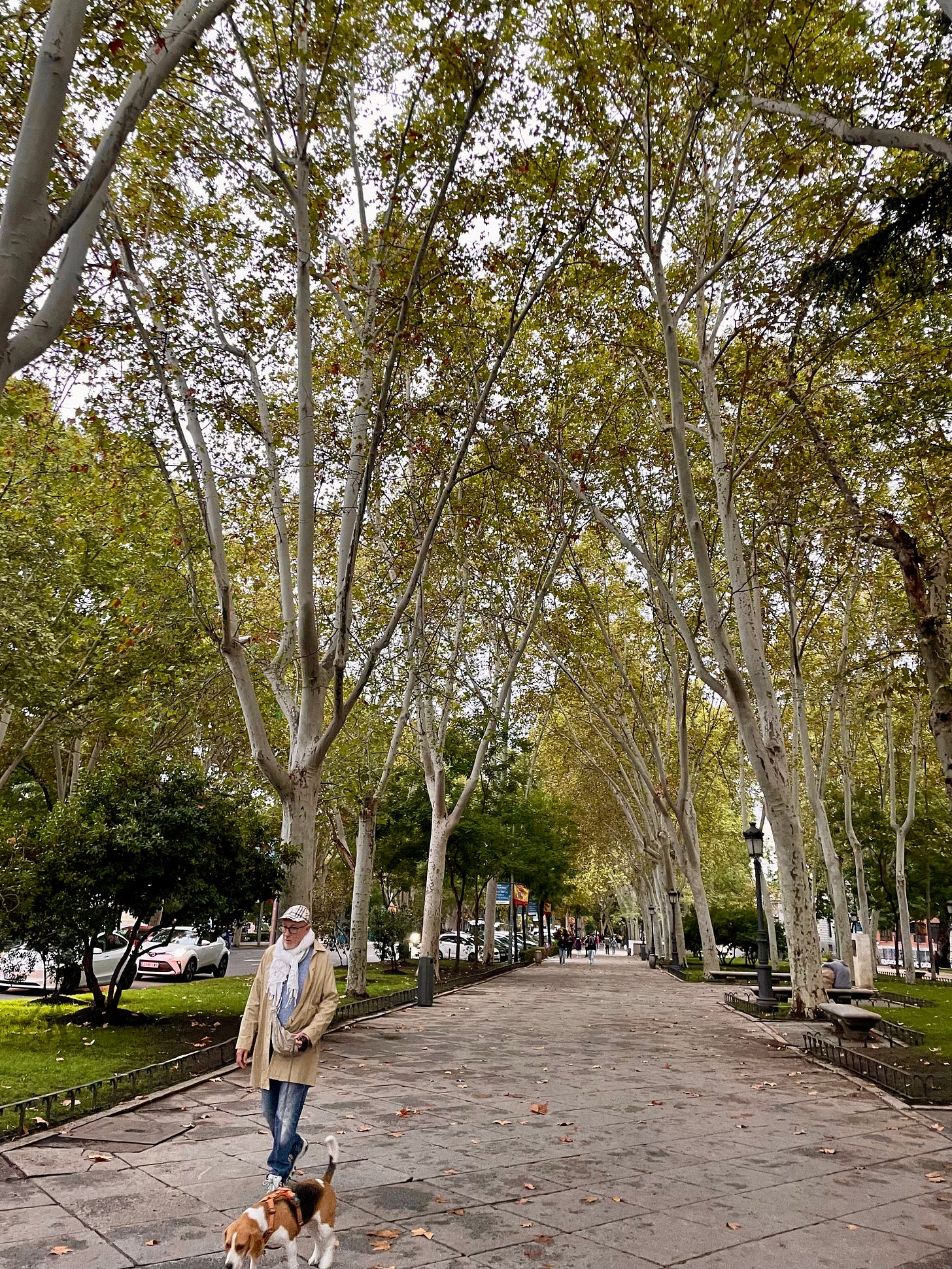
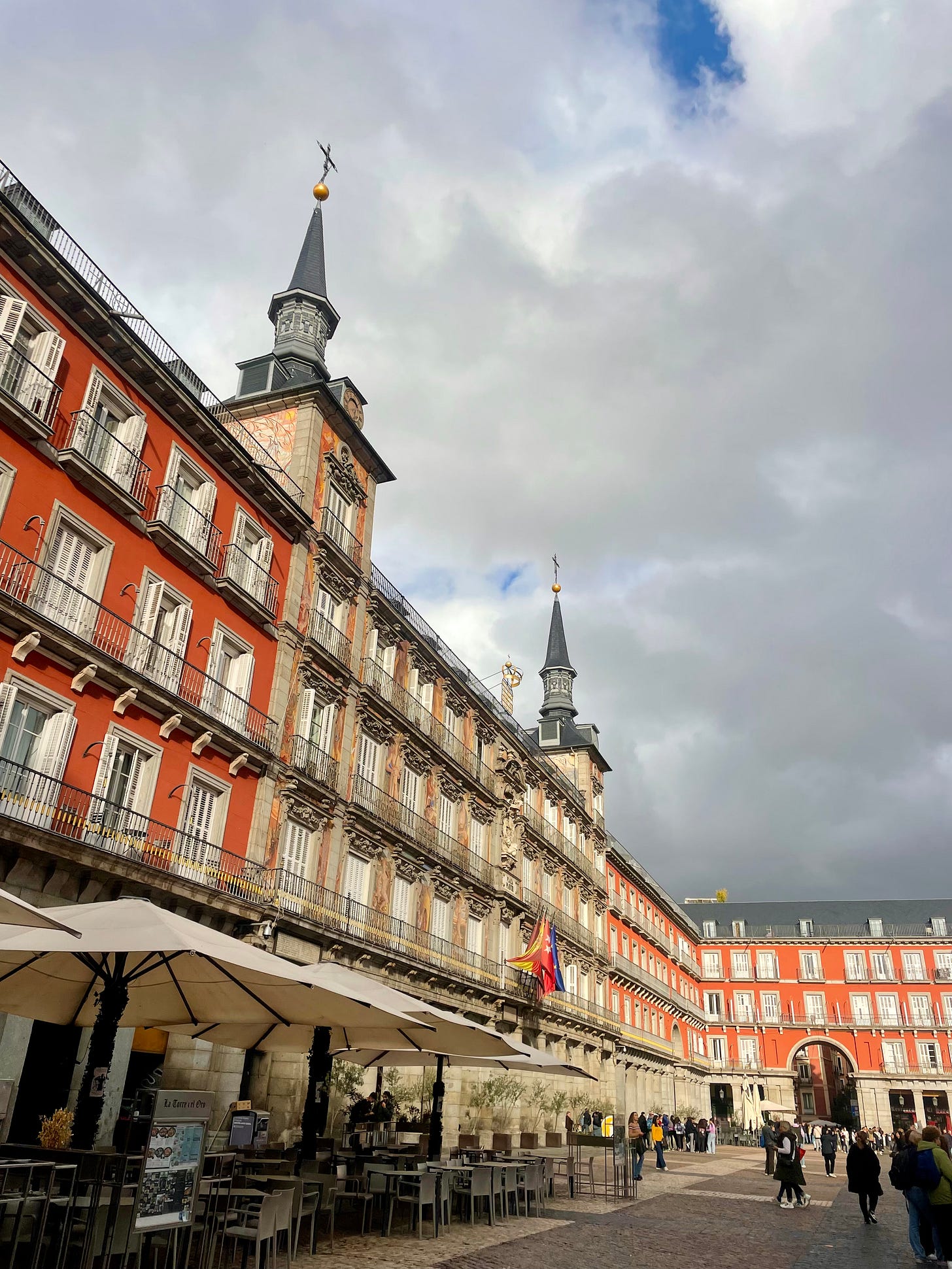
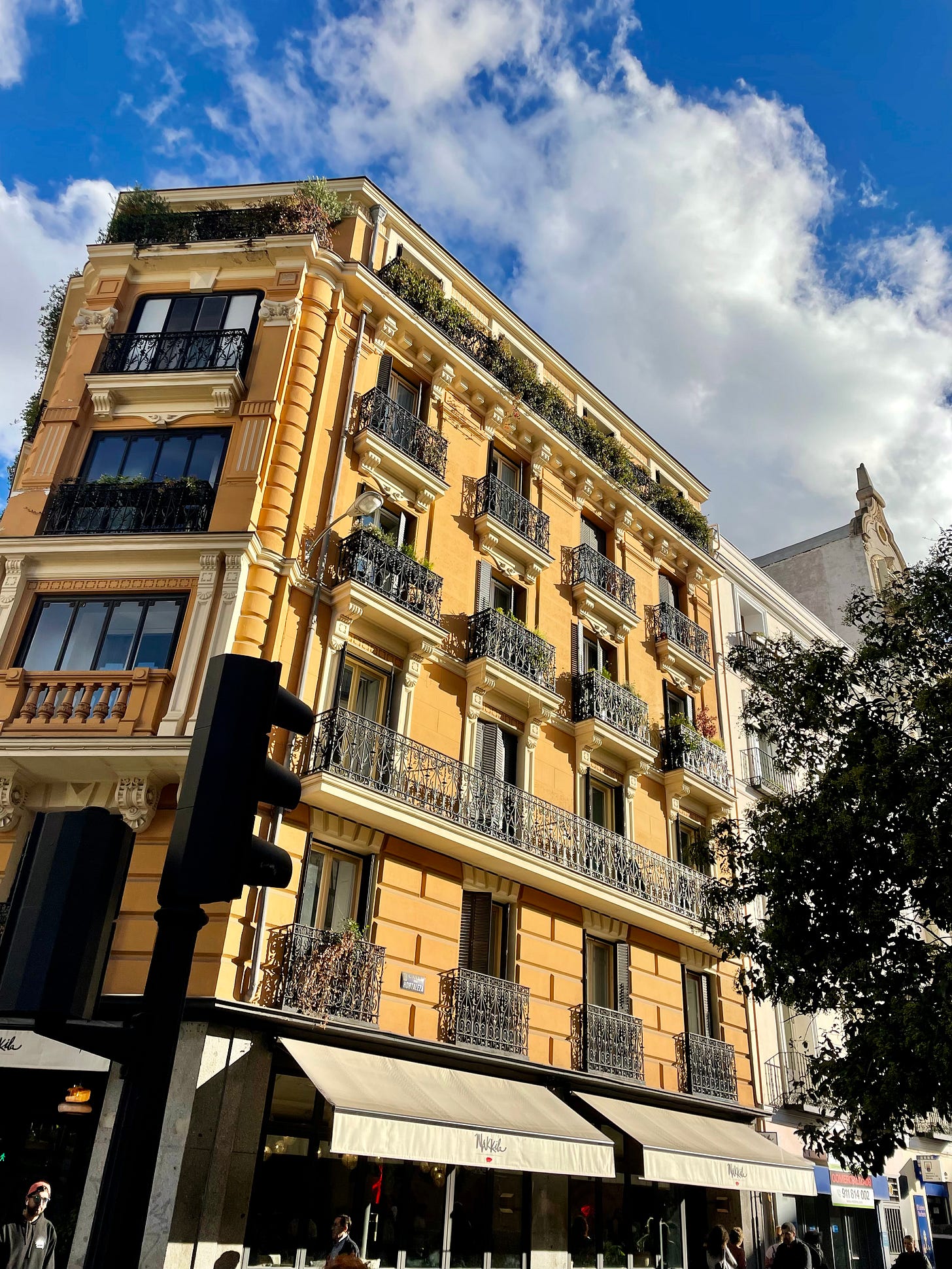
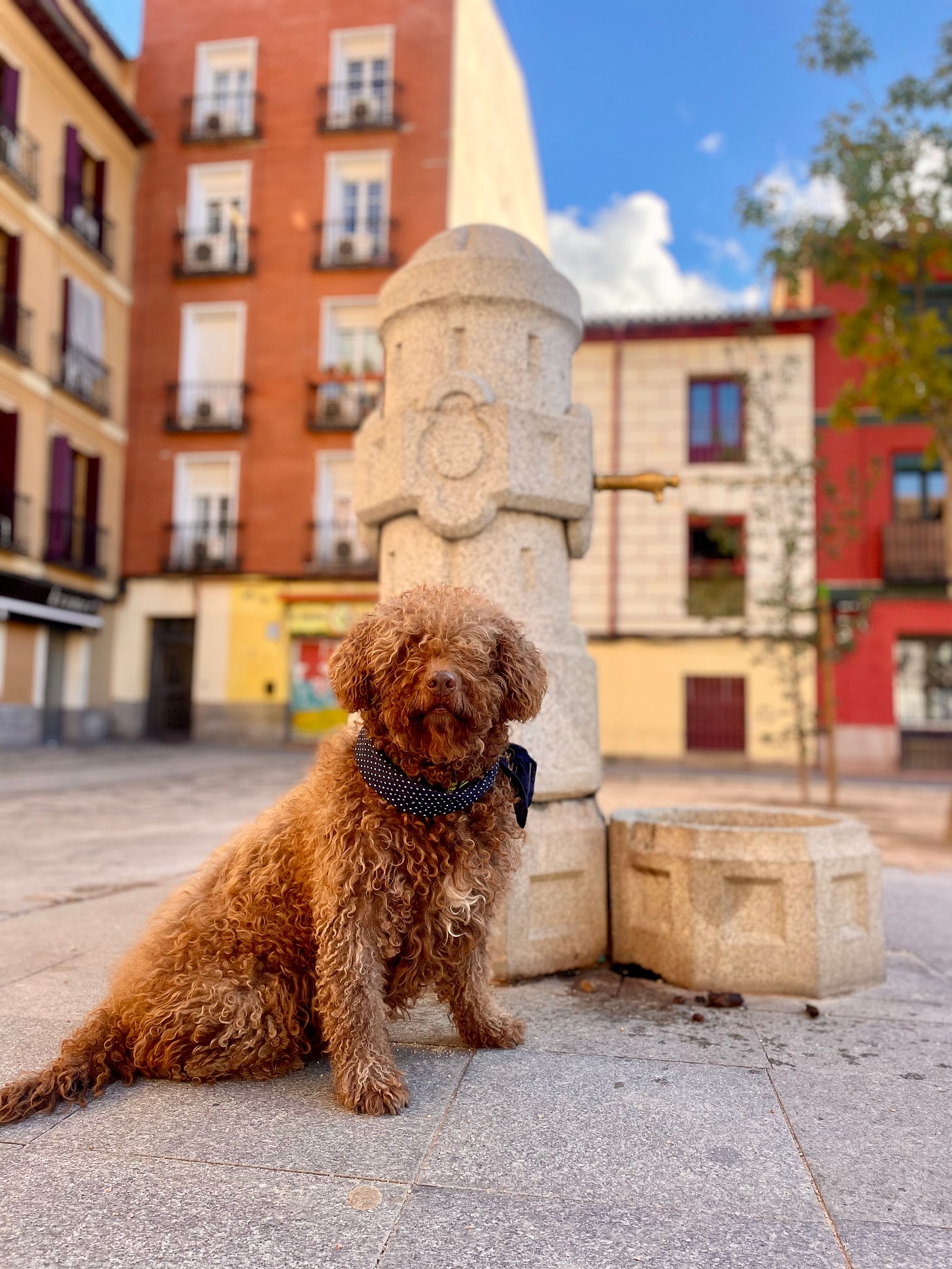
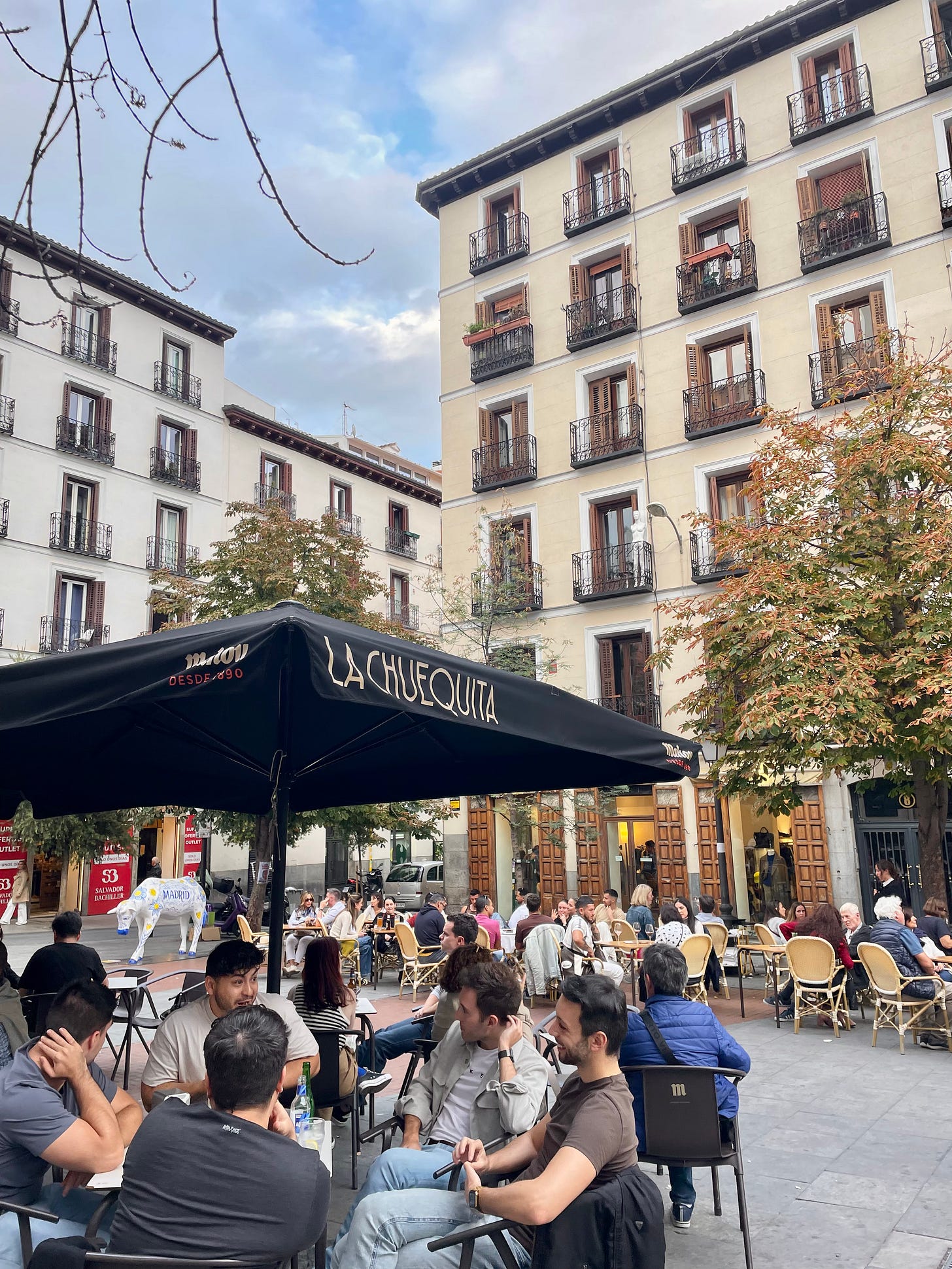

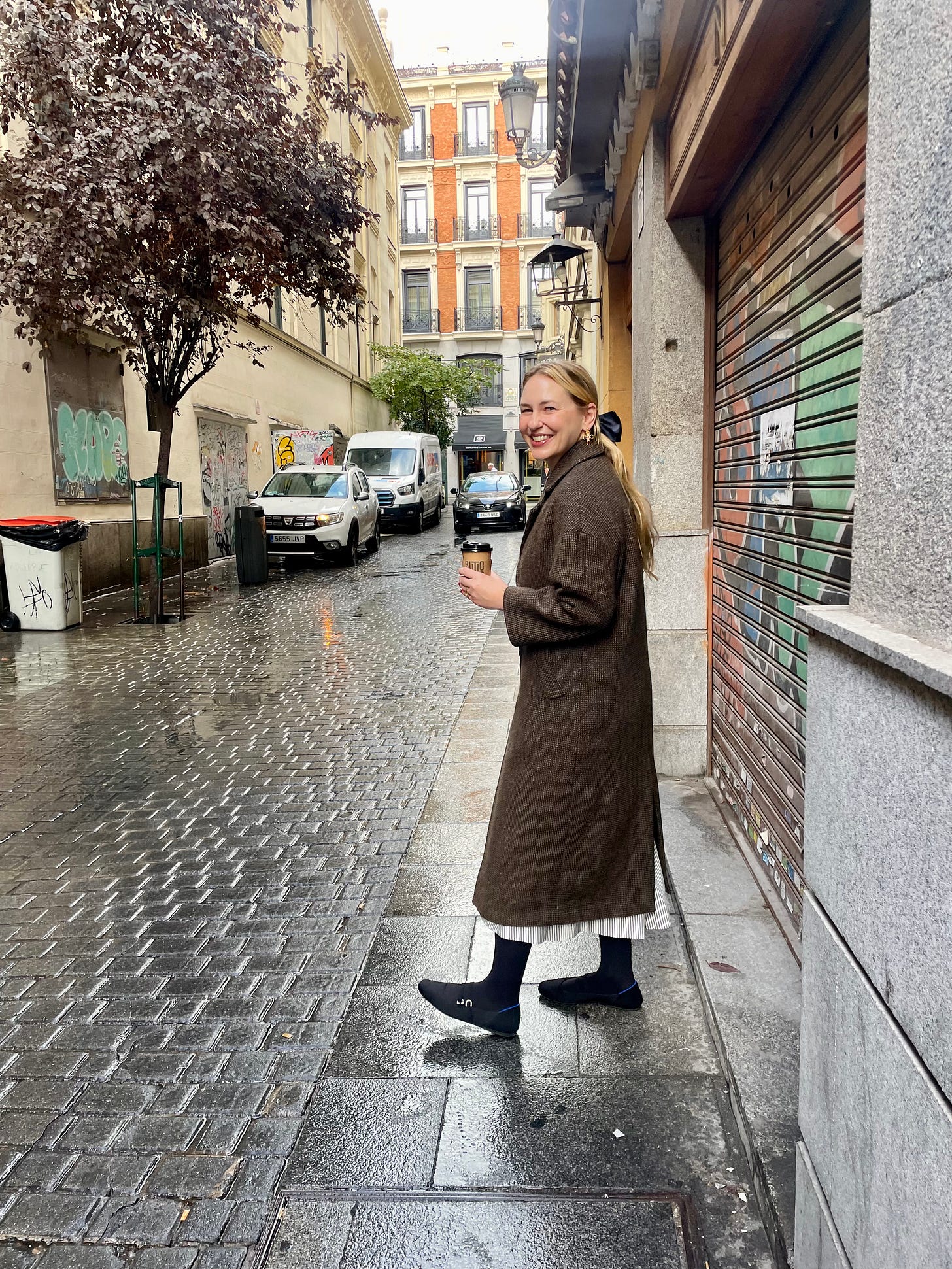
This was such a lovely read. It made my day .
♥️
Love this! Ten years ago I lived in Madrid for 6 months to learn Spanish - best time of my life!
It‘s such a special place ❤️